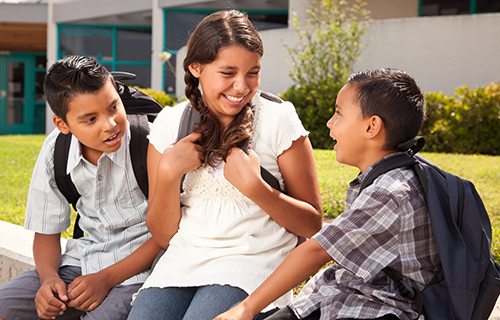The ASU SIBS program is designed to work with sisters and brothers in an afterschool setting to learn and practice new skills and participate in educational activities. Families with a 5th grade child and a younger sister or brother in the 1st, 2nd, 3rd, or 4th grades are invited to participate. All families will be assigned to one of the SIBS afterschool programs.
What does the program involve?
The ASU SIBS Program consists of 12 weekly afterschool sessions for small groups of sibling pairs. These afterschool sessions are designed to be educational and fun. We will also schedule three (3) Family Fun Nights for the families of children in each group, where families have dinner and see what their children are learning in the afterschool sessions.
Each parent will be asked to participate in three interviews and receive payment for each one. This includes a phone interview before the program starts ($35), a second phone interview after the program is over ($40), and a final interview 12 months later ($50). Children will complete surveys during afterschool sessions before the program starts and after the program ends, and then 12 months later (in the home). Parents also will receive $35 for their children's participation in seven nightly phone calls (about 10 minutes with each child) before the program begins, and $40 for participation in the seven nightly phone calls after the program ends.
The ASU SIBS Program is being offered in ten elementary schools in the Mesa Public School District.
Publications
Updegraff, K.A., Umaña-Taylor, A.J., Rodríguez De Jesús, S.A., McHale, S.M., Feinberg, M.F., Kuo, S.I. (in press). Family-focused Prevention with Latinos: What about Sisters and Brothers? Journal of Family Psychology. doi: 10.1037/fam0000200
Using a randomized, intent-to-treat design, this pilot study examined the feasibility and short-term effects of Siblings Are Special (SIBS) with a sample of 54 low-income Latino families (91% Mexican-origin). Participants were older (M = 10.8 years; SD = .46) and younger siblings (M = 8.4 years; SD = 1.13), and their parents (94% biological mothers), who were randomly assigned within school to the intervention (n = 28) or no-attention control (n = 26) condition. The intervention condition included 12 weekly afterschool sessions (90 minutes each) for sibling pairs and 3 family nights for parents and siblings (2 hours each). SIBS was designed to enhance sibling relationships via two primary intervention targets: (a) children's capacities that underlie positive sibling dynamics, including relationship skills, cognitions, and shared activities; and (b) parenting of siblings, specifically, enhancing positive guidance and involvement and discouraging authoritarian control. Pre- and post-test data were gathered from siblings and parents. Recruitment and implementation data revealed high rates of attendance and completion, and high ratings of parent satisfaction with the program. Further, analyses suggested the program had positive effects of small to modest magnitude on post-test measures of sibling and parent-child relationship quality, parenting of siblings, older siblings' emotional efficacy, and parents' depressive symptoms and parenting stress, controlling for pre-test levels of all outcomes and family background characteristics. Discussion addresses the feasibility of sibling-focused programs with low-income Latino families and makes recommendations for future research.
